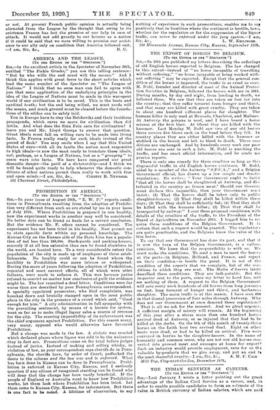THE EXPORT OF HORSES TO BELGIUM.
(To THE EDITOR or THE " SPECTATOR.") Sui,—In 1911 you published my letters describing the sufferings of old English horses exported to Belgium. Tho law changed to this extent—instead of "no horse incapable of travelling without suffering," "no horse incapable of being worked with- out suffering" may be exported. Except that the general con- dition of the horses is improved, the traffic is as cruel as ever. M. Buhl, founder and director of most of the Animal Protec- tion Societies in Belgium, followed the horses with me in 1914. During months, by day and night, from landing to death, we followed them. We saw that they are taken on foot far into the country; that they suffer torment from hunger and thirst, and that many are killed with great cruelty. They are taken to about one hundred different places for slaughter. The humane killer is only used at Brussels, Charleroi, and Malines. At Antwerp the poleaxe is used, and I have heard a horse sei•eam at the first blow. At Ghent they are killed with the hammer. Last Monday M. Buhl saw two of our old horses there receive five blows each on the head before they fell. In country places they are either killed with the hammer or stabbed in the breast and left to bleed to death. These cote ditions are unchanged. And by hundreds every week our poor old horses are sent to such a fate. M. Ruhl is watching the traffic, and has exact official information, and he sends me precise reports.
There is only one remedy for these cruelties eo long es this disgraceful traffic in old English horses continues. M.
aided by a member of the Antwerp "S.P.C.A.," and a Belgian Government official, has drawn up a few simple and drastic regulations. Ile writes: " Your Government ought to insist `that all the horses shall be slaughtered at Antwerp, and di. tributcd in the country as frozen meat.' Should our Govern- ment declaro this impossible, then your Government must insist: (1) That the horses shall be taken only to public slaughter-houses; (2) That they shall be killed within three days; (9) That they shall be sufficiently fed; (4) That they shall be killed with the humans killer; (5) That they shall be transported by railway." I sent these proposed conditions, with details of the cruelties of the traffic, to the President of the Board of Agriculture on November 20th. I begged him to re- quire these conditions of the Belgian Government. It is certain that such a request would be granted. The regulations are quite practicable, and the Belgians know the value of the live horse.
To say that our Government has done its part, and that it is now the turn of the Belgian Government, is a callous cynicism. We know that the responsibility is with us. We must make the conditions, To send a man to meet the horses at the ports—in Belgium, Holland, and France, and report on their condition—is beside the point. It is not of the condition of the exports that we complain, but of the con- ditions to which they are sent. The Matin d'Anrers lately described these conditions. They are indisputable. But the inspector sent to the ports, since my letter to Lord Lee, will see nothing of them. A request to the Belgian Government will save every week hundreds of old horses from long journeys on foot, long torment of hunger and thirst, and barbarous slaughter. Tho main traffic is at this season. I have seen 600 in that dismal procession of four miles through Antwerp. Why does not our Government at once demand those regulations?
That is all we ask for the moment. And wo plead urgency. A sufficient margin of misery will remain. At the beginning. of this year after a storm more than one hundred horses arrived dead at Antwerp, or so injured that they had to be killed at the docks. On the 6th of this month of twenty-three horses on the Leith boat two arrived dead. Eight on other boats were dead, or had to be killed on arrival. Five were conveyed in lorries to the slaughter-houeee. In the name of humanity and common sense, why are not our old horses con- verted into pressed meat and sausages at home for export? Such en industry would provide employment, save for us the valuable by-products that we give away, and put an end is
the most shameful cruelty.—I am, Sir, &e., A. K. F. Cols Hill Top, Cley-next-the-Sea, December 18th,


































 Previous page
Previous page